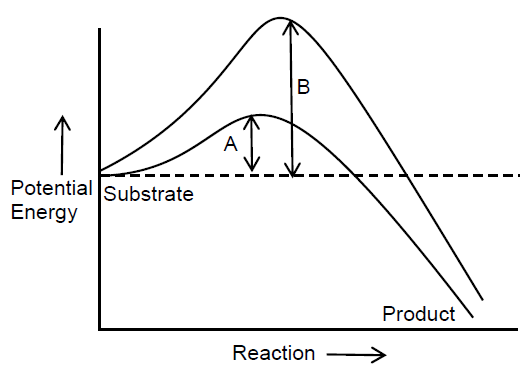In sea urchin DNA, which is double stranded, 17% of the bases were shown to be cytosine. The percentages of the other three bases expected to be present in this DNA are :
1. G 17%, A 16.5%,T32.5%
2. G 17%, A 33%,T 33%
3. G8.5%,A50%, T24.5%
4. G 34%,A 24.5%,T 24.5%
1. G 17%, A 16.5%,T32.5%
2. G 17%, A 33%,T 33%
3. G8.5%,A50%, T24.5%
4. G 34%,A 24.5%,T 24.5%
Which one of the following is not applicable to RNA?
1. 5’ phosphoryl and 3’ hydroxyl ends
2. Heterocyclic nitrogenous bases
3. Chargaff’s rule
4. Complementary base pairing
Which of the following biomolecules does have phosphodiester bond ?
1. Monosaccharides in a polysaccharide
2. Amino acids in a polypeptide
3. Nucleotides in a Nucleic acid
4. Fatty acids in a diglyceride
A typical fat molecule is made up of :
1. Three glycerol and three fatty acid molecules
2. Three glycerol molecules and one fatty acid molecule
3. One glycerol and three fatty acid molecules
4. One glycerol and one fatty acid molecule
Which one of the following statements is wrong?
1. Glycine is a sulphur containing amino acid.
2. Sucrose is a disaccharide.
3. Cellulose is a polysaccharide.
4. Uracil is a pyrimidine.
Which of the following is the least likely to be involved in stabilizing the three-dimensional folding of most proteins?
| 1. | Ester bonds | 2. | Hydrogen bonds |
| 3. | Electrostatic interaction | 4. | Hydrophobic interaction |
Which of the following describes the given graph correctly?

1. Exothermic reaction with energy A in absence of enzyme and B in presence of enzyme.
2. Endothermic reaction with energy A in presence of enzyme and B in absence of enzyme.
3. Exothermic reaction with energy A in presence of enzyme and B in absence of enzyme.
4. Endothermic reaction with energy A in absence of enzyme and B in presence of enzyme.
Which one of the following statements is correct with reference to enzymes?
1. Apoenzyme = Holoenzyme + Coenzyme
2. Holoenzyme = Apoenzyme + Coenzyme
3. Coenzyme = Apoenzyme + Holoenzyme
4. Holoenzyme = Coenzyme + Co-factor
Which of the following are not polymeric?
| 1. | nucleic acids | 2. | proteins |
| 3. | polysaccharides | 4. | Lipids |
Cellulose, the most important constituent of plant cell wall, is made of
| 1. | Unbranched chain of glucose molecules linked by α 1, 4 glycosidic bond |
| 2. | Branched chain of glucose molecules linked by β 1, 4 glycosidic bond in straight chain and β 1, 6 glycosidic bond at the site of branching |
| 3. | Unbranched chain of glucose molecules linked by β 1, 4 glycosidic bond |
| 4. | Branched chain of glucose molecules linked by α 1, 6 glycosidic bond at the site of branching |






